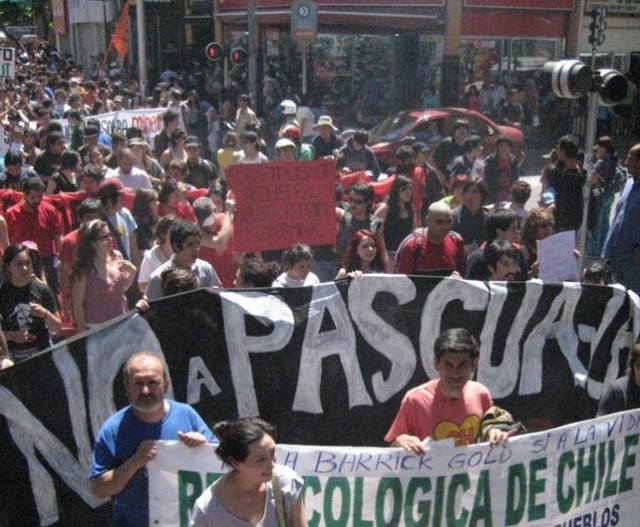On one side of the world in Chile, over a thousand people went into the streets with costumes, music, and dancing to protest the proposed Pascua Lama gold project – a multi-billion dollar project that Barrick has been boasting the late 90’s – which threatens the fertile Huasco Valley. Meanwhile, almost the same number of strikers at Barrick’s Bulyanhulu mine in Tanzania refused to work after negotiations with Barrick management brokedown over salaries, working conditions, medical care and other contentious issues. Within four days, Barrick fired every striking worker. This article provides background to these conflicts.
On one side of the world in Chile, over a thousand people went into the streets with costumes, music, and dancing to protest the proposed Pascua Lama gold project – a multi-billion dollar project that Barrick has been boasting the late 90’s – which threatens the fertile Huasco Valley. Meanwhile, almost the same number of strikers at Barrick’s Bulyanhulu mine in Tanzania refused to work after negotiations with Barrick management brokedown over salaries, working conditions, medical care and other contentious issues. Within four days, Barrick fired every striking worker.
While Barrick projects an image free from political controversy, these latest flares of organized resistance represent on-going struggles, discontent, and anger aimed at this mining giant.
When Opposing Pascua Lama was politically mainstream
For people outside Chile, it might be easy to forget that anti-gold mining sentiments aimed at protecting the environment dominated both President Bachelet and her erstwhile opponent, Sebastián Piñera’s election platforms last year. Both assured their constituents that the glaciers – which are situated right in the middle of a UNESCO biosphere reserve – would not be touched.
Then, in move that mine opponents believe was planned from the start, Barrick abandoned their first proposal to relocate the glaciers and the project was approved, with conditions meant to preserve the environmental integrity of the area’s sensitive ecosystem.
The mine’s opponents, including the Diaguita Huascoaltinos Indigenous group and Alto del Carmen councilperson Luís Faura Cortes, remained undeterred by what they see as paper assurances and politicking. What’s more, Barrick’s exploration activities have since been publicly revealed to be linked to a 56 to 70 percent depletion in the glaciers near the mine site, contradicting assurances in their environmental assessment reports.
Last weekend’s protest was just the latest in a series of protests against this mining project, and it represents that the resistance is still alive, and that folks on the ground in Chile are not deceived by Barrick’s political maneuverings.
Firing the Opposition will only make it burn Stronger
In Tanzania, it has been almost ten years since an estimated 30,000-400,000 small-scale miners were forced off the Buyanhulu mine site to make way for corporate mining. But this week’s decision to fire the thousand striking miners will no doubt rekindle this historic resentment. The deal to take this mining concession away from these small-scale miners was brokered by Sutton Resources’ CEO James Sinclair, who was a friend of the president of Tanzania and several senior ministers, as was his daughter.
Accusations of high-level nepotism have since plagued the Bulyanhulu operations, with allegations of millions in tax evasion surfacing last year. Additionally, just this July the Tanzanian government was criticized for signing a mining agreement with Barrick prematurely, and selling it’s 15 percent stake in the Bulyanhulu mine for too little money.
Beneath the political veneer, it appears that Barrick must appease growing movements of discontent. For more information on resistance to Barrick Gold in Nevada, Chile, Argentina, Tanzania, Australia, Peru, visit protestbarrick.net.
While Barrick projects an image free from political controversy, these latest flares of organized resistance represent on-going struggles, discontent, and anger aimed at this mining giant.
When Opposing Pascua Lama was politically mainstream
For people outside Chile, it might be easy to forget that anti-gold mining sentiments aimed at protecting the environment dominated both President Bachelet and her erstwhile opponent, Sebastián Piñera’s election platforms last year. Both assured their constituents that the glaciers – which are situated right in the middle of a UNESCO biosphere reserve – would not be touched.
Then, in move that mine opponents believe was planned from the start, Barrick abandoned their first proposal to relocate the glaciers and the project was approved, with conditions meant to preserve the environmental integrity of the area’s sensitive ecosystem.
The mine’s opponents, including the Diaguita Huascoaltinos Indigenous group and Alto del Carmen councilperson Luís Faura Cortes, remained undeterred by what they see as paper assurances and politicking. What’s more, Barrick’s exploration activities have since been publicly revealed to be linked to a 56 to 70 percent depletion in the glaciers near the mine site, contradicting assurances in their environmental assessment reports.
Last weekend’s protest was just the latest in a series of protests against this mining project, and it represents that the resistance is still alive, and that folks on the ground in Chile are not deceived by Barrick’s political maneuverings.
Firing the Opposition will only make it burn Stronger
In Tanzania, it has been almost ten years since an estimated 30,000-400,000 small-scale miners were forced off the Buyanhulu mine site to make way for corporate mining. But this week’s decision to fire the thousand striking miners will no doubt rekindle this historic resentment. The deal to take this mining concession away from these small-scale miners was brokered by Sutton Resources’ CEO James Sinclair, who was a friend of the president of Tanzania and several senior ministers, as was his daughter.
Accusations of high-level nepotism have since plagued the Bulyanhulu operations, with allegations of millions in tax evasion surfacing last year. Additionally, just this July the Tanzanian government was criticized for signing a mining agreement with Barrick prematurely, and selling it’s 15 percent stake in the Bulyanhulu mine for too little money.
Beneath the political veneer, it appears that Barrick must appease growing movements of discontent. For more information on resistance to Barrick Gold in Nevada, Chile, Argentina, Tanzania, Australia, Peru, visit protestbarrick.net.


No comments:
Post a Comment